Organisation Behaviour Report
VerifiedAdded on 2020/12/09
|11
|3488
|355
Report
AI Summary
This report analyzes organizational behavior concepts using Tesco as a case study. It examines power, culture, and politics, motivation theories, effective vs. ineffective teams, and key philosophies and concepts of organizational behavior. The report aims to provide insights into how Tesco can utilize these concepts to improve employee performance and achieve organizational goals.
Contribute Materials
Your contribution can guide someone’s learning journey. Share your
documents today.
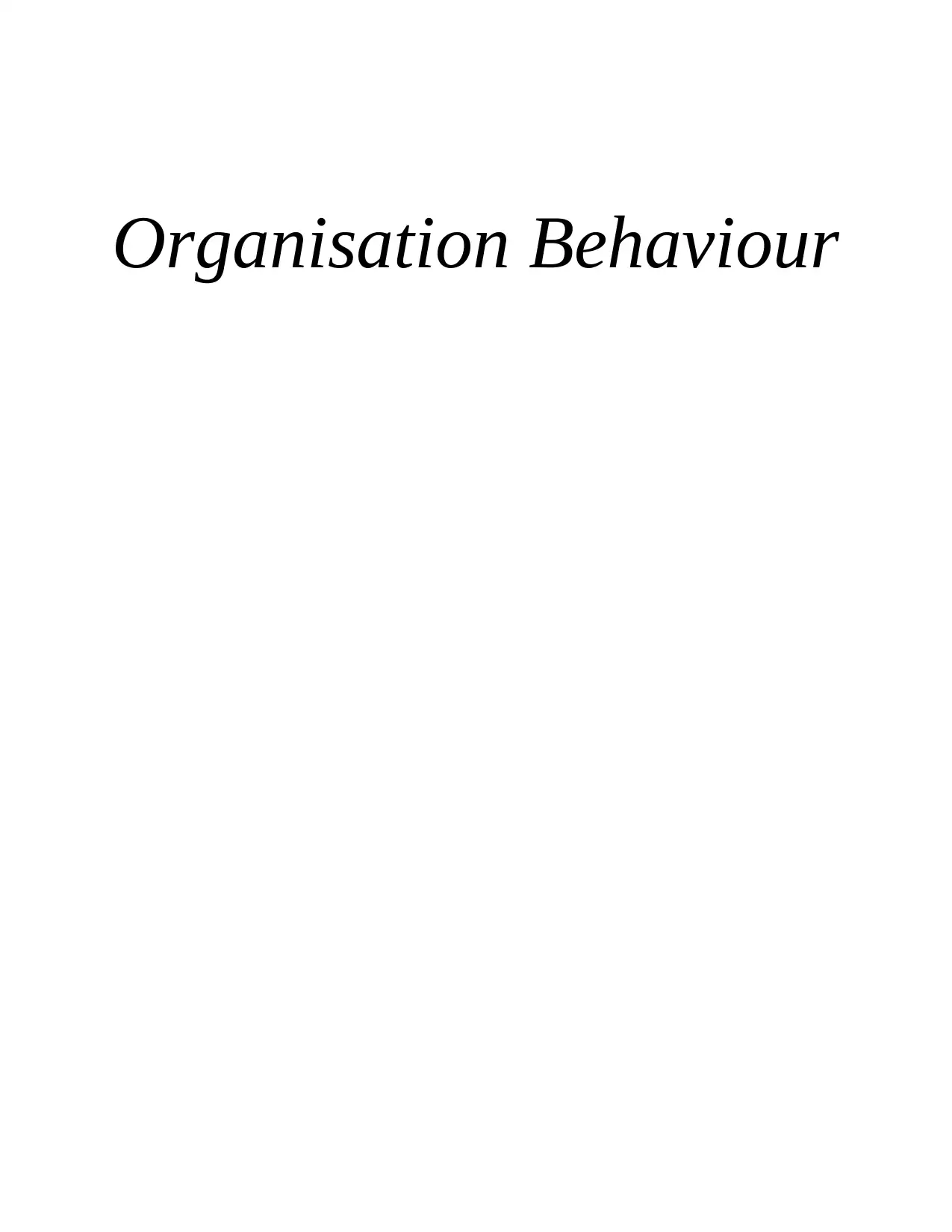
Organisation Behaviour
Secure Best Marks with AI Grader
Need help grading? Try our AI Grader for instant feedback on your assignments.
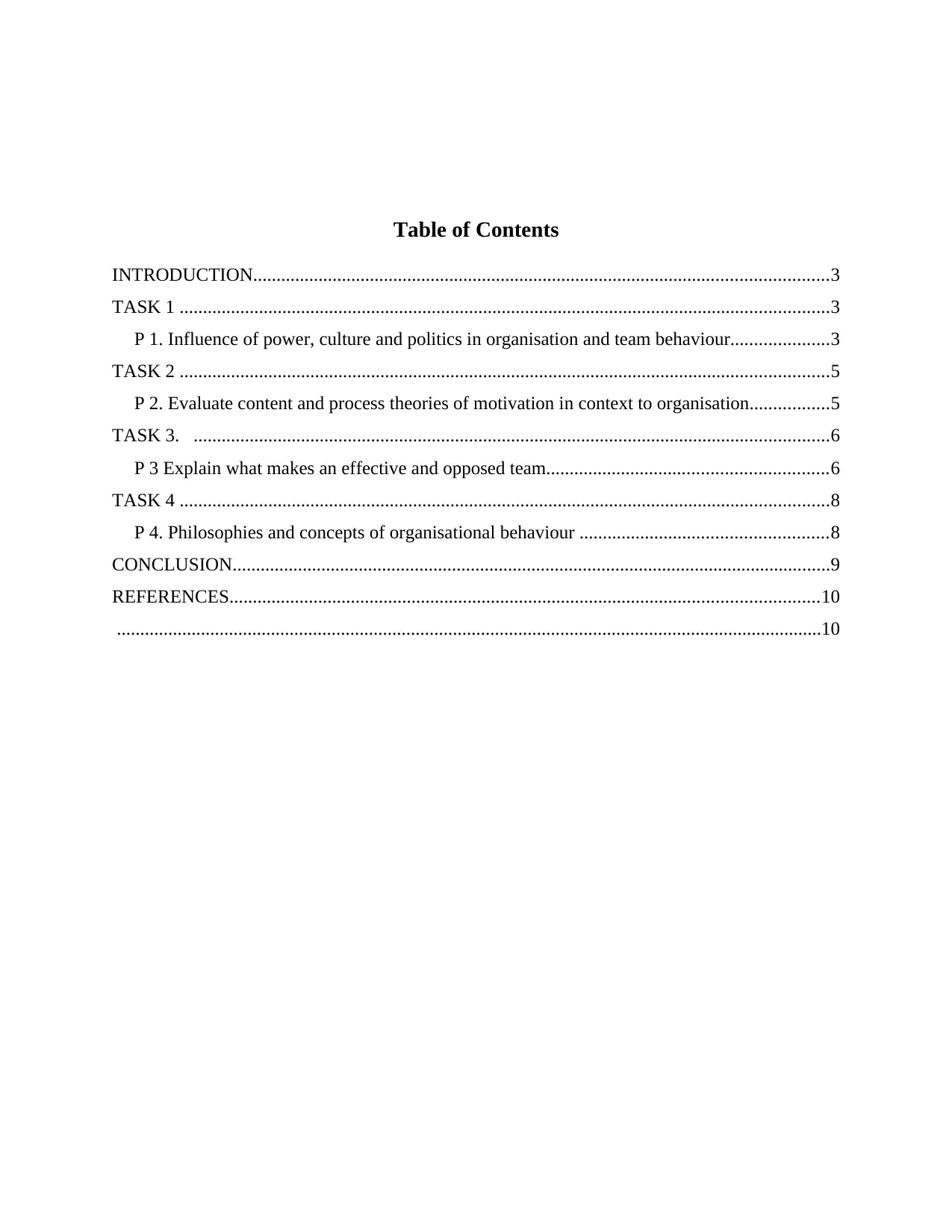
Table of Contents
INTRODUCTION...........................................................................................................................3
TASK 1 ...........................................................................................................................................3
P 1. Influence of power, culture and politics in organisation and team behaviour.....................3
TASK 2 ...........................................................................................................................................5
P 2. Evaluate content and process theories of motivation in context to organisation.................5
TASK 3. ........................................................................................................................................6
P 3 Explain what makes an effective and opposed team............................................................6
TASK 4 ...........................................................................................................................................8
P 4. Philosophies and concepts of organisational behaviour .....................................................8
CONCLUSION................................................................................................................................9
REFERENCES..............................................................................................................................10
.......................................................................................................................................................10
INTRODUCTION...........................................................................................................................3
TASK 1 ...........................................................................................................................................3
P 1. Influence of power, culture and politics in organisation and team behaviour.....................3
TASK 2 ...........................................................................................................................................5
P 2. Evaluate content and process theories of motivation in context to organisation.................5
TASK 3. ........................................................................................................................................6
P 3 Explain what makes an effective and opposed team............................................................6
TASK 4 ...........................................................................................................................................8
P 4. Philosophies and concepts of organisational behaviour .....................................................8
CONCLUSION................................................................................................................................9
REFERENCES..............................................................................................................................10
.......................................................................................................................................................10
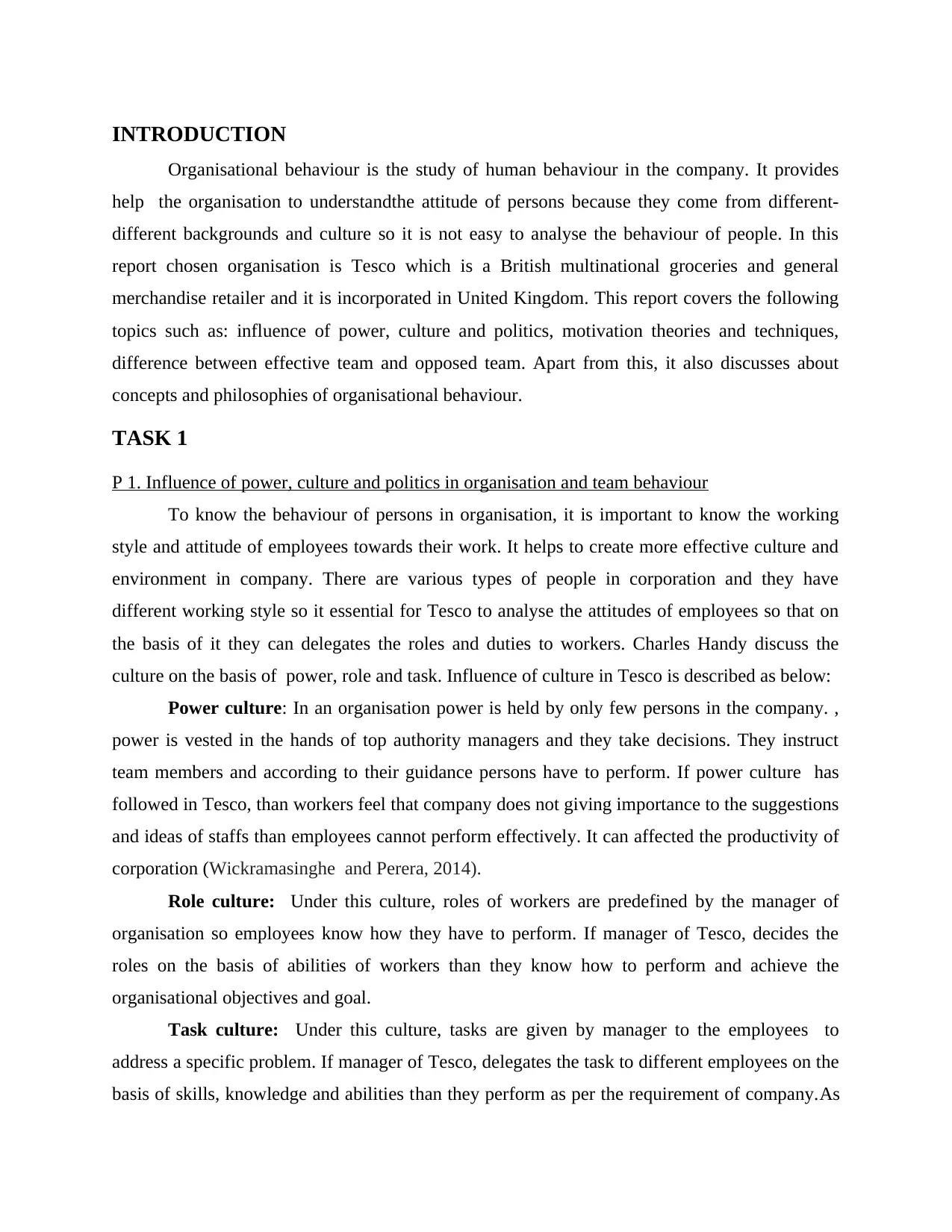
INTRODUCTION
Organisational behaviour is the study of human behaviour in the company. It provides
help the organisation to understandthe attitude of persons because they come from different-
different backgrounds and culture so it is not easy to analyse the behaviour of people. In this
report chosen organisation is Tesco which is a British multinational groceries and general
merchandise retailer and it is incorporated in United Kingdom. This report covers the following
topics such as: influence of power, culture and politics, motivation theories and techniques,
difference between effective team and opposed team. Apart from this, it also discusses about
concepts and philosophies of organisational behaviour.
TASK 1
P 1. Influence of power, culture and politics in organisation and team behaviour
To know the behaviour of persons in organisation, it is important to know the working
style and attitude of employees towards their work. It helps to create more effective culture and
environment in company. There are various types of people in corporation and they have
different working style so it essential for Tesco to analyse the attitudes of employees so that on
the basis of it they can delegates the roles and duties to workers. Charles Handy discuss the
culture on the basis of power, role and task. Influence of culture in Tesco is described as below:
Power culture: In an organisation power is held by only few persons in the company. ,
power is vested in the hands of top authority managers and they take decisions. They instruct
team members and according to their guidance persons have to perform. If power culture has
followed in Tesco, than workers feel that company does not giving importance to the suggestions
and ideas of staffs than employees cannot perform effectively. It can affected the productivity of
corporation (Wickramasinghe and Perera, 2014).
Role culture: Under this culture, roles of workers are predefined by the manager of
organisation so employees know how they have to perform. If manager of Tesco, decides the
roles on the basis of abilities of workers than they know how to perform and achieve the
organisational objectives and goal.
Task culture: Under this culture, tasks are given by manager to the employees to
address a specific problem. If manager of Tesco, delegates the task to different employees on the
basis of skills, knowledge and abilities than they perform as per the requirement of company.As
Organisational behaviour is the study of human behaviour in the company. It provides
help the organisation to understandthe attitude of persons because they come from different-
different backgrounds and culture so it is not easy to analyse the behaviour of people. In this
report chosen organisation is Tesco which is a British multinational groceries and general
merchandise retailer and it is incorporated in United Kingdom. This report covers the following
topics such as: influence of power, culture and politics, motivation theories and techniques,
difference between effective team and opposed team. Apart from this, it also discusses about
concepts and philosophies of organisational behaviour.
TASK 1
P 1. Influence of power, culture and politics in organisation and team behaviour
To know the behaviour of persons in organisation, it is important to know the working
style and attitude of employees towards their work. It helps to create more effective culture and
environment in company. There are various types of people in corporation and they have
different working style so it essential for Tesco to analyse the attitudes of employees so that on
the basis of it they can delegates the roles and duties to workers. Charles Handy discuss the
culture on the basis of power, role and task. Influence of culture in Tesco is described as below:
Power culture: In an organisation power is held by only few persons in the company. ,
power is vested in the hands of top authority managers and they take decisions. They instruct
team members and according to their guidance persons have to perform. If power culture has
followed in Tesco, than workers feel that company does not giving importance to the suggestions
and ideas of staffs than employees cannot perform effectively. It can affected the productivity of
corporation (Wickramasinghe and Perera, 2014).
Role culture: Under this culture, roles of workers are predefined by the manager of
organisation so employees know how they have to perform. If manager of Tesco, decides the
roles on the basis of abilities of workers than they know how to perform and achieve the
organisational objectives and goal.
Task culture: Under this culture, tasks are given by manager to the employees to
address a specific problem. If manager of Tesco, delegates the task to different employees on the
basis of skills, knowledge and abilities than they perform as per the requirement of company.As
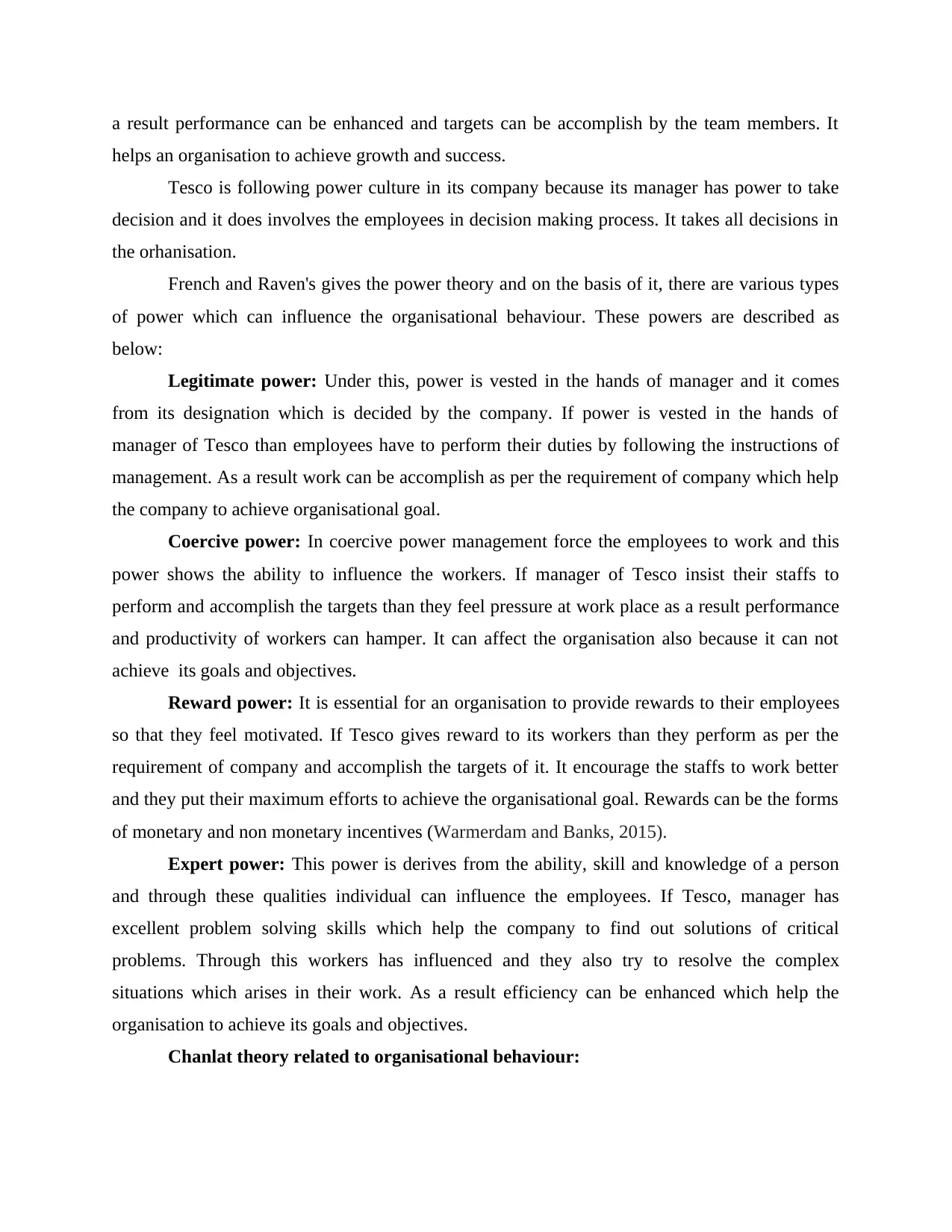
a result performance can be enhanced and targets can be accomplish by the team members. It
helps an organisation to achieve growth and success.
Tesco is following power culture in its company because its manager has power to take
decision and it does involves the employees in decision making process. It takes all decisions in
the orhanisation.
French and Raven's gives the power theory and on the basis of it, there are various types
of power which can influence the organisational behaviour. These powers are described as
below:
Legitimate power: Under this, power is vested in the hands of manager and it comes
from its designation which is decided by the company. If power is vested in the hands of
manager of Tesco than employees have to perform their duties by following the instructions of
management. As a result work can be accomplish as per the requirement of company which help
the company to achieve organisational goal.
Coercive power: In coercive power management force the employees to work and this
power shows the ability to influence the workers. If manager of Tesco insist their staffs to
perform and accomplish the targets than they feel pressure at work place as a result performance
and productivity of workers can hamper. It can affect the organisation also because it can not
achieve its goals and objectives.
Reward power: It is essential for an organisation to provide rewards to their employees
so that they feel motivated. If Tesco gives reward to its workers than they perform as per the
requirement of company and accomplish the targets of it. It encourage the staffs to work better
and they put their maximum efforts to achieve the organisational goal. Rewards can be the forms
of monetary and non monetary incentives (Warmerdam and Banks, 2015).
Expert power: This power is derives from the ability, skill and knowledge of a person
and through these qualities individual can influence the employees. If Tesco, manager has
excellent problem solving skills which help the company to find out solutions of critical
problems. Through this workers has influenced and they also try to resolve the complex
situations which arises in their work. As a result efficiency can be enhanced which help the
organisation to achieve its goals and objectives.
Chanlat theory related to organisational behaviour:
helps an organisation to achieve growth and success.
Tesco is following power culture in its company because its manager has power to take
decision and it does involves the employees in decision making process. It takes all decisions in
the orhanisation.
French and Raven's gives the power theory and on the basis of it, there are various types
of power which can influence the organisational behaviour. These powers are described as
below:
Legitimate power: Under this, power is vested in the hands of manager and it comes
from its designation which is decided by the company. If power is vested in the hands of
manager of Tesco than employees have to perform their duties by following the instructions of
management. As a result work can be accomplish as per the requirement of company which help
the company to achieve organisational goal.
Coercive power: In coercive power management force the employees to work and this
power shows the ability to influence the workers. If manager of Tesco insist their staffs to
perform and accomplish the targets than they feel pressure at work place as a result performance
and productivity of workers can hamper. It can affect the organisation also because it can not
achieve its goals and objectives.
Reward power: It is essential for an organisation to provide rewards to their employees
so that they feel motivated. If Tesco gives reward to its workers than they perform as per the
requirement of company and accomplish the targets of it. It encourage the staffs to work better
and they put their maximum efforts to achieve the organisational goal. Rewards can be the forms
of monetary and non monetary incentives (Warmerdam and Banks, 2015).
Expert power: This power is derives from the ability, skill and knowledge of a person
and through these qualities individual can influence the employees. If Tesco, manager has
excellent problem solving skills which help the company to find out solutions of critical
problems. Through this workers has influenced and they also try to resolve the complex
situations which arises in their work. As a result efficiency can be enhanced which help the
organisation to achieve its goals and objectives.
Chanlat theory related to organisational behaviour:
Secure Best Marks with AI Grader
Need help grading? Try our AI Grader for instant feedback on your assignments.
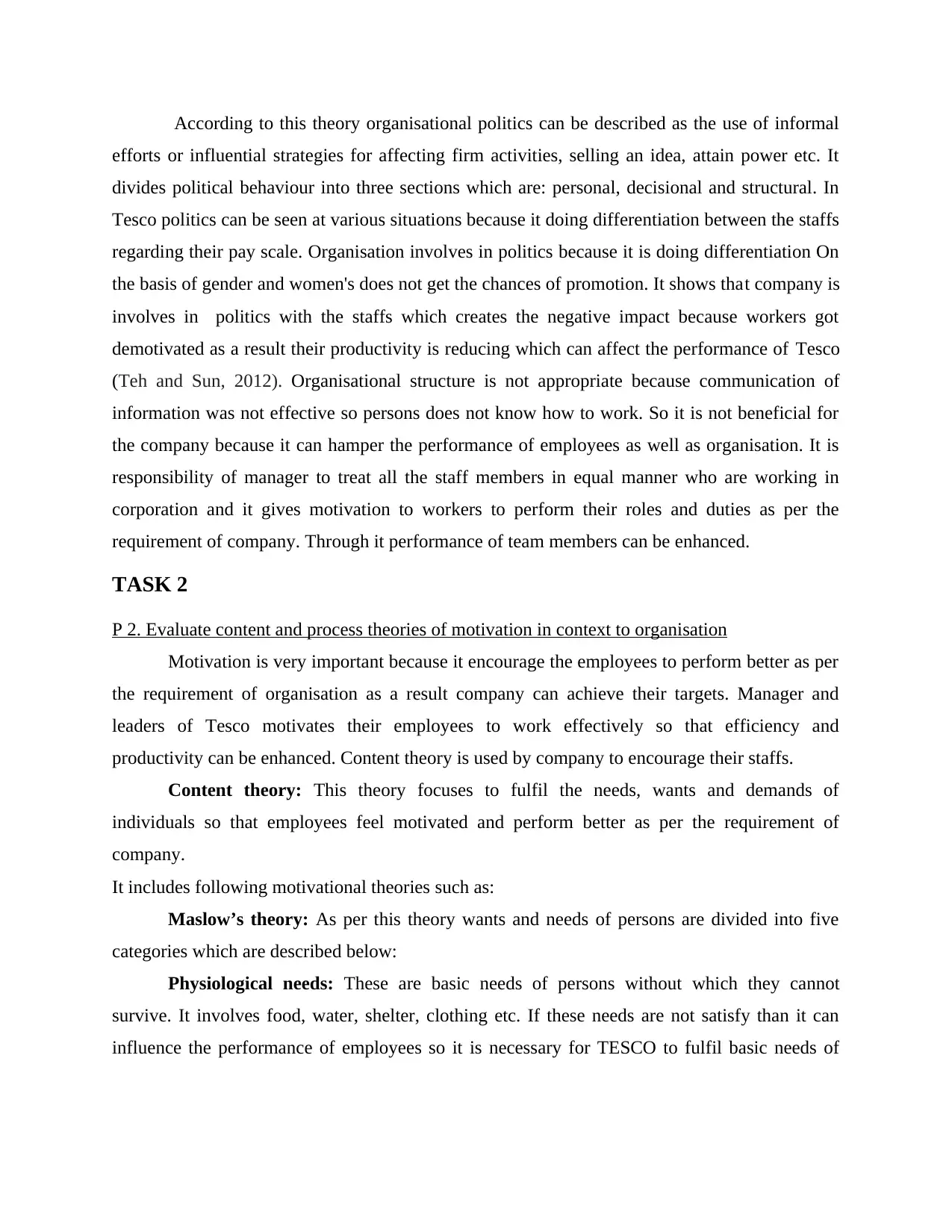
According to this theory organisational politics can be described as the use of informal
efforts or influential strategies for affecting firm activities, selling an idea, attain power etc. It
divides political behaviour into three sections which are: personal, decisional and structural. In
Tesco politics can be seen at various situations because it doing differentiation between the staffs
regarding their pay scale. Organisation involves in politics because it is doing differentiation On
the basis of gender and women's does not get the chances of promotion. It shows that company is
involves in politics with the staffs which creates the negative impact because workers got
demotivated as a result their productivity is reducing which can affect the performance of Tesco
(Teh and Sun, 2012). Organisational structure is not appropriate because communication of
information was not effective so persons does not know how to work. So it is not beneficial for
the company because it can hamper the performance of employees as well as organisation. It is
responsibility of manager to treat all the staff members in equal manner who are working in
corporation and it gives motivation to workers to perform their roles and duties as per the
requirement of company. Through it performance of team members can be enhanced.
TASK 2
P 2. Evaluate content and process theories of motivation in context to organisation
Motivation is very important because it encourage the employees to perform better as per
the requirement of organisation as a result company can achieve their targets. Manager and
leaders of Tesco motivates their employees to work effectively so that efficiency and
productivity can be enhanced. Content theory is used by company to encourage their staffs.
Content theory: This theory focuses to fulfil the needs, wants and demands of
individuals so that employees feel motivated and perform better as per the requirement of
company.
It includes following motivational theories such as:
Maslow’s theory: As per this theory wants and needs of persons are divided into five
categories which are described below:
Physiological needs: These are basic needs of persons without which they cannot
survive. It involves food, water, shelter, clothing etc. If these needs are not satisfy than it can
influence the performance of employees so it is necessary for TESCO to fulfil basic needs of
efforts or influential strategies for affecting firm activities, selling an idea, attain power etc. It
divides political behaviour into three sections which are: personal, decisional and structural. In
Tesco politics can be seen at various situations because it doing differentiation between the staffs
regarding their pay scale. Organisation involves in politics because it is doing differentiation On
the basis of gender and women's does not get the chances of promotion. It shows that company is
involves in politics with the staffs which creates the negative impact because workers got
demotivated as a result their productivity is reducing which can affect the performance of Tesco
(Teh and Sun, 2012). Organisational structure is not appropriate because communication of
information was not effective so persons does not know how to work. So it is not beneficial for
the company because it can hamper the performance of employees as well as organisation. It is
responsibility of manager to treat all the staff members in equal manner who are working in
corporation and it gives motivation to workers to perform their roles and duties as per the
requirement of company. Through it performance of team members can be enhanced.
TASK 2
P 2. Evaluate content and process theories of motivation in context to organisation
Motivation is very important because it encourage the employees to perform better as per
the requirement of organisation as a result company can achieve their targets. Manager and
leaders of Tesco motivates their employees to work effectively so that efficiency and
productivity can be enhanced. Content theory is used by company to encourage their staffs.
Content theory: This theory focuses to fulfil the needs, wants and demands of
individuals so that employees feel motivated and perform better as per the requirement of
company.
It includes following motivational theories such as:
Maslow’s theory: As per this theory wants and needs of persons are divided into five
categories which are described below:
Physiological needs: These are basic needs of persons without which they cannot
survive. It involves food, water, shelter, clothing etc. If these needs are not satisfy than it can
influence the performance of employees so it is necessary for TESCO to fulfil basic needs of
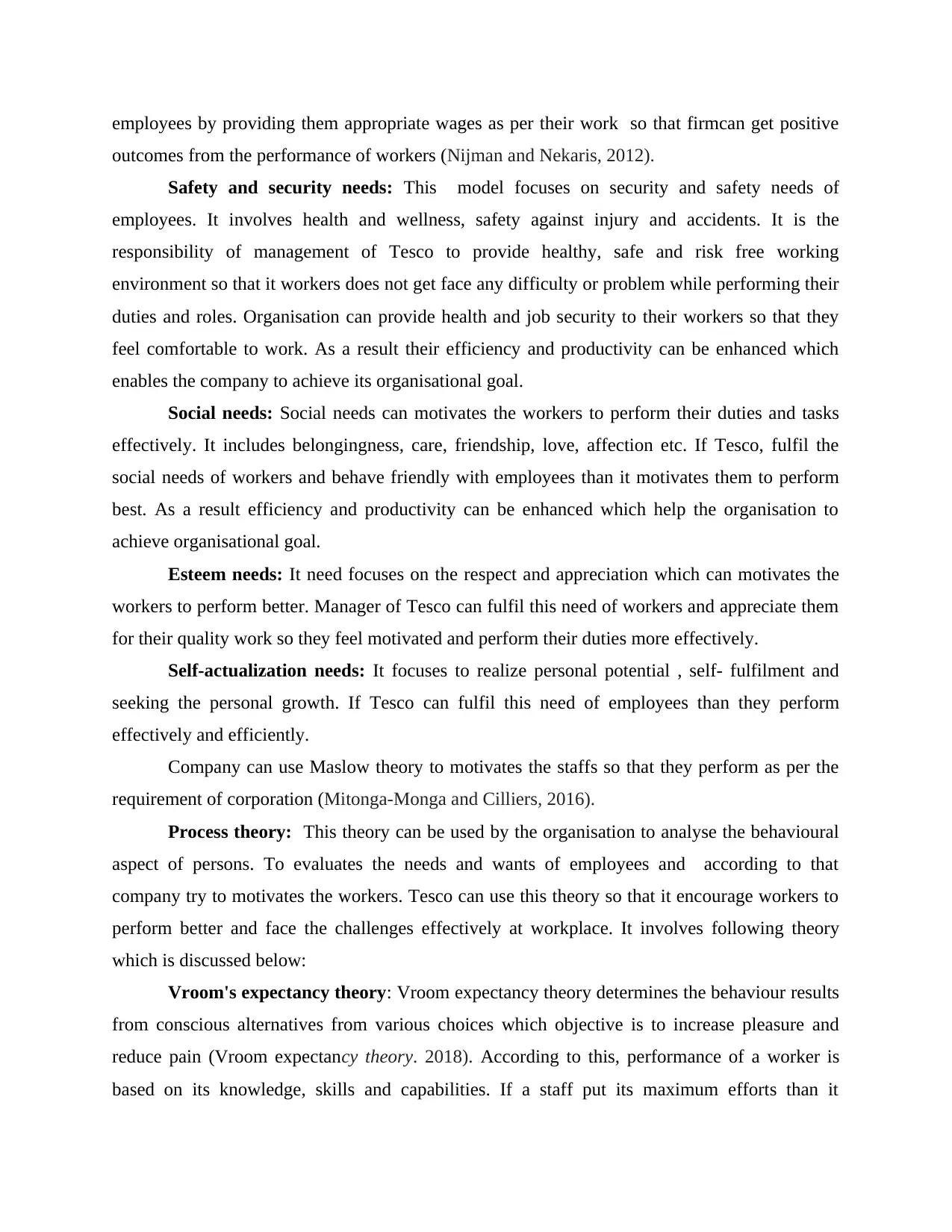
employees by providing them appropriate wages as per their work so that firmcan get positive
outcomes from the performance of workers (Nijman and Nekaris, 2012).
Safety and security needs: This model focuses on security and safety needs of
employees. It involves health and wellness, safety against injury and accidents. It is the
responsibility of management of Tesco to provide healthy, safe and risk free working
environment so that it workers does not get face any difficulty or problem while performing their
duties and roles. Organisation can provide health and job security to their workers so that they
feel comfortable to work. As a result their efficiency and productivity can be enhanced which
enables the company to achieve its organisational goal.
Social needs: Social needs can motivates the workers to perform their duties and tasks
effectively. It includes belongingness, care, friendship, love, affection etc. If Tesco, fulfil the
social needs of workers and behave friendly with employees than it motivates them to perform
best. As a result efficiency and productivity can be enhanced which help the organisation to
achieve organisational goal.
Esteem needs: It need focuses on the respect and appreciation which can motivates the
workers to perform better. Manager of Tesco can fulfil this need of workers and appreciate them
for their quality work so they feel motivated and perform their duties more effectively.
Self-actualization needs: It focuses to realize personal potential , self- fulfilment and
seeking the personal growth. If Tesco can fulfil this need of employees than they perform
effectively and efficiently.
Company can use Maslow theory to motivates the staffs so that they perform as per the
requirement of corporation (Mitonga-Monga and Cilliers, 2016).
Process theory: This theory can be used by the organisation to analyse the behavioural
aspect of persons. To evaluates the needs and wants of employees and according to that
company try to motivates the workers. Tesco can use this theory so that it encourage workers to
perform better and face the challenges effectively at workplace. It involves following theory
which is discussed below:
Vroom's expectancy theory: Vroom expectancy theory determines the behaviour results
from conscious alternatives from various choices which objective is to increase pleasure and
reduce pain (Vroom expectancy theory. 2018). According to this, performance of a worker is
based on its knowledge, skills and capabilities. If a staff put its maximum efforts than it
outcomes from the performance of workers (Nijman and Nekaris, 2012).
Safety and security needs: This model focuses on security and safety needs of
employees. It involves health and wellness, safety against injury and accidents. It is the
responsibility of management of Tesco to provide healthy, safe and risk free working
environment so that it workers does not get face any difficulty or problem while performing their
duties and roles. Organisation can provide health and job security to their workers so that they
feel comfortable to work. As a result their efficiency and productivity can be enhanced which
enables the company to achieve its organisational goal.
Social needs: Social needs can motivates the workers to perform their duties and tasks
effectively. It includes belongingness, care, friendship, love, affection etc. If Tesco, fulfil the
social needs of workers and behave friendly with employees than it motivates them to perform
best. As a result efficiency and productivity can be enhanced which help the organisation to
achieve organisational goal.
Esteem needs: It need focuses on the respect and appreciation which can motivates the
workers to perform better. Manager of Tesco can fulfil this need of workers and appreciate them
for their quality work so they feel motivated and perform their duties more effectively.
Self-actualization needs: It focuses to realize personal potential , self- fulfilment and
seeking the personal growth. If Tesco can fulfil this need of employees than they perform
effectively and efficiently.
Company can use Maslow theory to motivates the staffs so that they perform as per the
requirement of corporation (Mitonga-Monga and Cilliers, 2016).
Process theory: This theory can be used by the organisation to analyse the behavioural
aspect of persons. To evaluates the needs and wants of employees and according to that
company try to motivates the workers. Tesco can use this theory so that it encourage workers to
perform better and face the challenges effectively at workplace. It involves following theory
which is discussed below:
Vroom's expectancy theory: Vroom expectancy theory determines the behaviour results
from conscious alternatives from various choices which objective is to increase pleasure and
reduce pain (Vroom expectancy theory. 2018). According to this, performance of a worker is
based on its knowledge, skills and capabilities. If a staff put its maximum efforts than it
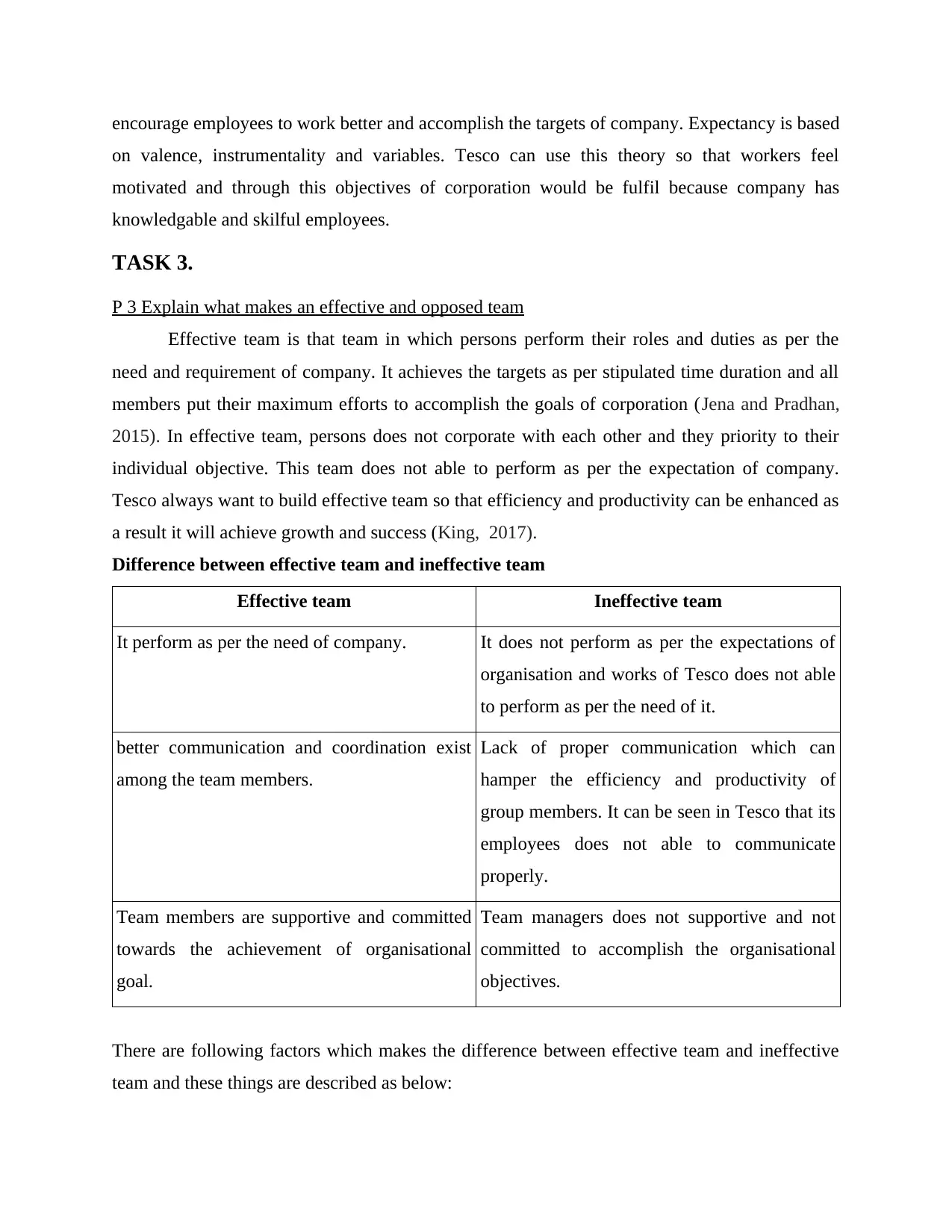
encourage employees to work better and accomplish the targets of company. Expectancy is based
on valence, instrumentality and variables. Tesco can use this theory so that workers feel
motivated and through this objectives of corporation would be fulfil because company has
knowledgable and skilful employees.
TASK 3.
P 3 Explain what makes an effective and opposed team
Effective team is that team in which persons perform their roles and duties as per the
need and requirement of company. It achieves the targets as per stipulated time duration and all
members put their maximum efforts to accomplish the goals of corporation (Jena and Pradhan,
2015). In effective team, persons does not corporate with each other and they priority to their
individual objective. This team does not able to perform as per the expectation of company.
Tesco always want to build effective team so that efficiency and productivity can be enhanced as
a result it will achieve growth and success (King, 2017).
Difference between effective team and ineffective team
Effective team Ineffective team
It perform as per the need of company. It does not perform as per the expectations of
organisation and works of Tesco does not able
to perform as per the need of it.
better communication and coordination exist
among the team members.
Lack of proper communication which can
hamper the efficiency and productivity of
group members. It can be seen in Tesco that its
employees does not able to communicate
properly.
Team members are supportive and committed
towards the achievement of organisational
goal.
Team managers does not supportive and not
committed to accomplish the organisational
objectives.
There are following factors which makes the difference between effective team and ineffective
team and these things are described as below:
on valence, instrumentality and variables. Tesco can use this theory so that workers feel
motivated and through this objectives of corporation would be fulfil because company has
knowledgable and skilful employees.
TASK 3.
P 3 Explain what makes an effective and opposed team
Effective team is that team in which persons perform their roles and duties as per the
need and requirement of company. It achieves the targets as per stipulated time duration and all
members put their maximum efforts to accomplish the goals of corporation (Jena and Pradhan,
2015). In effective team, persons does not corporate with each other and they priority to their
individual objective. This team does not able to perform as per the expectation of company.
Tesco always want to build effective team so that efficiency and productivity can be enhanced as
a result it will achieve growth and success (King, 2017).
Difference between effective team and ineffective team
Effective team Ineffective team
It perform as per the need of company. It does not perform as per the expectations of
organisation and works of Tesco does not able
to perform as per the need of it.
better communication and coordination exist
among the team members.
Lack of proper communication which can
hamper the efficiency and productivity of
group members. It can be seen in Tesco that its
employees does not able to communicate
properly.
Team members are supportive and committed
towards the achievement of organisational
goal.
Team managers does not supportive and not
committed to accomplish the organisational
objectives.
There are following factors which makes the difference between effective team and ineffective
team and these things are described as below:
Paraphrase This Document
Need a fresh take? Get an instant paraphrase of this document with our AI Paraphraser
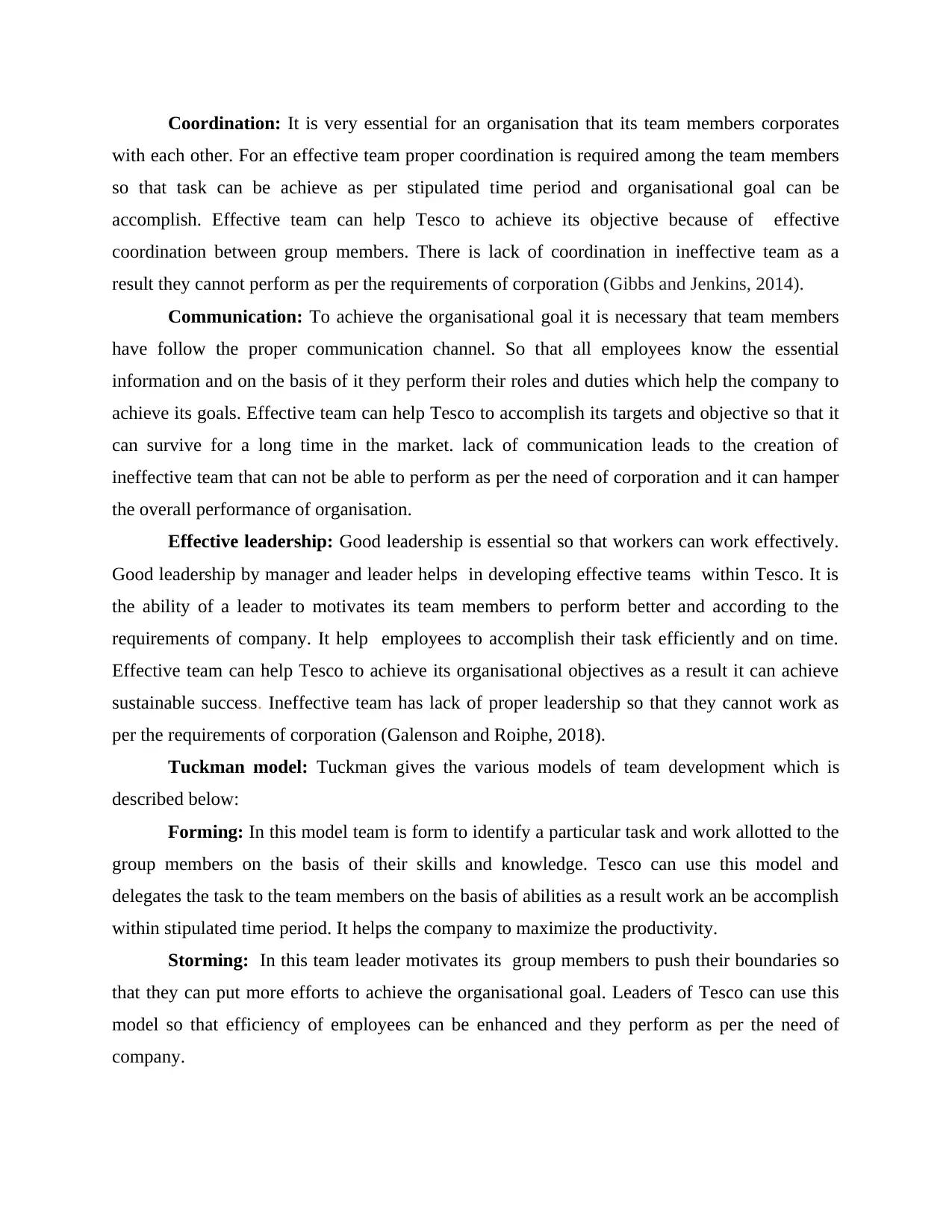
Coordination: It is very essential for an organisation that its team members corporates
with each other. For an effective team proper coordination is required among the team members
so that task can be achieve as per stipulated time period and organisational goal can be
accomplish. Effective team can help Tesco to achieve its objective because of effective
coordination between group members. There is lack of coordination in ineffective team as a
result they cannot perform as per the requirements of corporation (Gibbs and Jenkins, 2014).
Communication: To achieve the organisational goal it is necessary that team members
have follow the proper communication channel. So that all employees know the essential
information and on the basis of it they perform their roles and duties which help the company to
achieve its goals. Effective team can help Tesco to accomplish its targets and objective so that it
can survive for a long time in the market. lack of communication leads to the creation of
ineffective team that can not be able to perform as per the need of corporation and it can hamper
the overall performance of organisation.
Effective leadership: Good leadership is essential so that workers can work effectively.
Good leadership by manager and leader helps in developing effective teams within Tesco. It is
the ability of a leader to motivates its team members to perform better and according to the
requirements of company. It help employees to accomplish their task efficiently and on time.
Effective team can help Tesco to achieve its organisational objectives as a result it can achieve
sustainable success. Ineffective team has lack of proper leadership so that they cannot work as
per the requirements of corporation (Galenson and Roiphe, 2018).
Tuckman model: Tuckman gives the various models of team development which is
described below:
Forming: In this model team is form to identify a particular task and work allotted to the
group members on the basis of their skills and knowledge. Tesco can use this model and
delegates the task to the team members on the basis of abilities as a result work an be accomplish
within stipulated time period. It helps the company to maximize the productivity.
Storming: In this team leader motivates its group members to push their boundaries so
that they can put more efforts to achieve the organisational goal. Leaders of Tesco can use this
model so that efficiency of employees can be enhanced and they perform as per the need of
company.
with each other. For an effective team proper coordination is required among the team members
so that task can be achieve as per stipulated time period and organisational goal can be
accomplish. Effective team can help Tesco to achieve its objective because of effective
coordination between group members. There is lack of coordination in ineffective team as a
result they cannot perform as per the requirements of corporation (Gibbs and Jenkins, 2014).
Communication: To achieve the organisational goal it is necessary that team members
have follow the proper communication channel. So that all employees know the essential
information and on the basis of it they perform their roles and duties which help the company to
achieve its goals. Effective team can help Tesco to accomplish its targets and objective so that it
can survive for a long time in the market. lack of communication leads to the creation of
ineffective team that can not be able to perform as per the need of corporation and it can hamper
the overall performance of organisation.
Effective leadership: Good leadership is essential so that workers can work effectively.
Good leadership by manager and leader helps in developing effective teams within Tesco. It is
the ability of a leader to motivates its team members to perform better and according to the
requirements of company. It help employees to accomplish their task efficiently and on time.
Effective team can help Tesco to achieve its organisational objectives as a result it can achieve
sustainable success. Ineffective team has lack of proper leadership so that they cannot work as
per the requirements of corporation (Galenson and Roiphe, 2018).
Tuckman model: Tuckman gives the various models of team development which is
described below:
Forming: In this model team is form to identify a particular task and work allotted to the
group members on the basis of their skills and knowledge. Tesco can use this model and
delegates the task to the team members on the basis of abilities as a result work an be accomplish
within stipulated time period. It helps the company to maximize the productivity.
Storming: In this team leader motivates its group members to push their boundaries so
that they can put more efforts to achieve the organisational goal. Leaders of Tesco can use this
model so that efficiency of employees can be enhanced and they perform as per the need of
company.
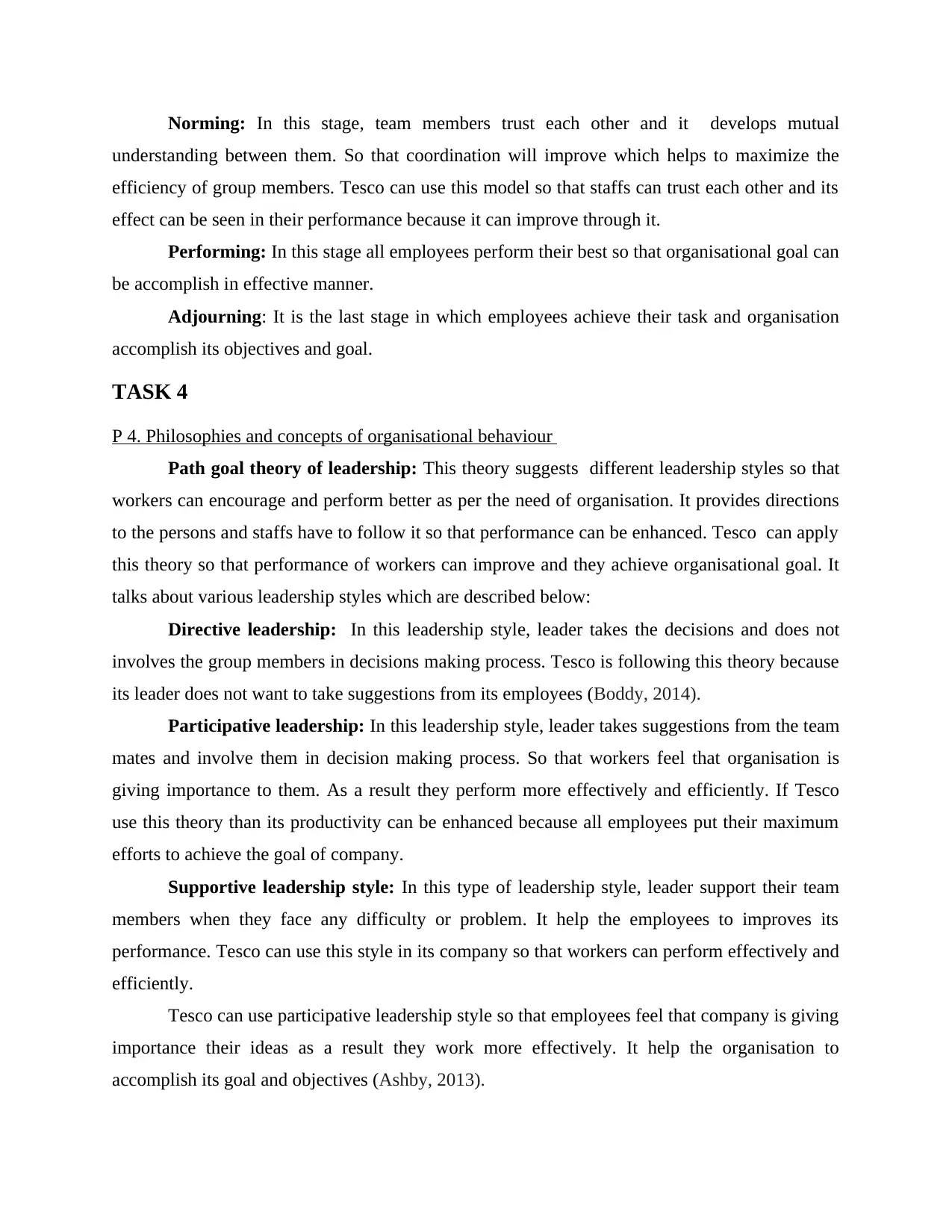
Norming: In this stage, team members trust each other and it develops mutual
understanding between them. So that coordination will improve which helps to maximize the
efficiency of group members. Tesco can use this model so that staffs can trust each other and its
effect can be seen in their performance because it can improve through it.
Performing: In this stage all employees perform their best so that organisational goal can
be accomplish in effective manner.
Adjourning: It is the last stage in which employees achieve their task and organisation
accomplish its objectives and goal.
TASK 4
P 4. Philosophies and concepts of organisational behaviour
Path goal theory of leadership: This theory suggests different leadership styles so that
workers can encourage and perform better as per the need of organisation. It provides directions
to the persons and staffs have to follow it so that performance can be enhanced. Tesco can apply
this theory so that performance of workers can improve and they achieve organisational goal. It
talks about various leadership styles which are described below:
Directive leadership: In this leadership style, leader takes the decisions and does not
involves the group members in decisions making process. Tesco is following this theory because
its leader does not want to take suggestions from its employees (Boddy, 2014).
Participative leadership: In this leadership style, leader takes suggestions from the team
mates and involve them in decision making process. So that workers feel that organisation is
giving importance to them. As a result they perform more effectively and efficiently. If Tesco
use this theory than its productivity can be enhanced because all employees put their maximum
efforts to achieve the goal of company.
Supportive leadership style: In this type of leadership style, leader support their team
members when they face any difficulty or problem. It help the employees to improves its
performance. Tesco can use this style in its company so that workers can perform effectively and
efficiently.
Tesco can use participative leadership style so that employees feel that company is giving
importance their ideas as a result they work more effectively. It help the organisation to
accomplish its goal and objectives (Ashby, 2013).
understanding between them. So that coordination will improve which helps to maximize the
efficiency of group members. Tesco can use this model so that staffs can trust each other and its
effect can be seen in their performance because it can improve through it.
Performing: In this stage all employees perform their best so that organisational goal can
be accomplish in effective manner.
Adjourning: It is the last stage in which employees achieve their task and organisation
accomplish its objectives and goal.
TASK 4
P 4. Philosophies and concepts of organisational behaviour
Path goal theory of leadership: This theory suggests different leadership styles so that
workers can encourage and perform better as per the need of organisation. It provides directions
to the persons and staffs have to follow it so that performance can be enhanced. Tesco can apply
this theory so that performance of workers can improve and they achieve organisational goal. It
talks about various leadership styles which are described below:
Directive leadership: In this leadership style, leader takes the decisions and does not
involves the group members in decisions making process. Tesco is following this theory because
its leader does not want to take suggestions from its employees (Boddy, 2014).
Participative leadership: In this leadership style, leader takes suggestions from the team
mates and involve them in decision making process. So that workers feel that organisation is
giving importance to them. As a result they perform more effectively and efficiently. If Tesco
use this theory than its productivity can be enhanced because all employees put their maximum
efforts to achieve the goal of company.
Supportive leadership style: In this type of leadership style, leader support their team
members when they face any difficulty or problem. It help the employees to improves its
performance. Tesco can use this style in its company so that workers can perform effectively and
efficiently.
Tesco can use participative leadership style so that employees feel that company is giving
importance their ideas as a result they work more effectively. It help the organisation to
accomplish its goal and objectives (Ashby, 2013).
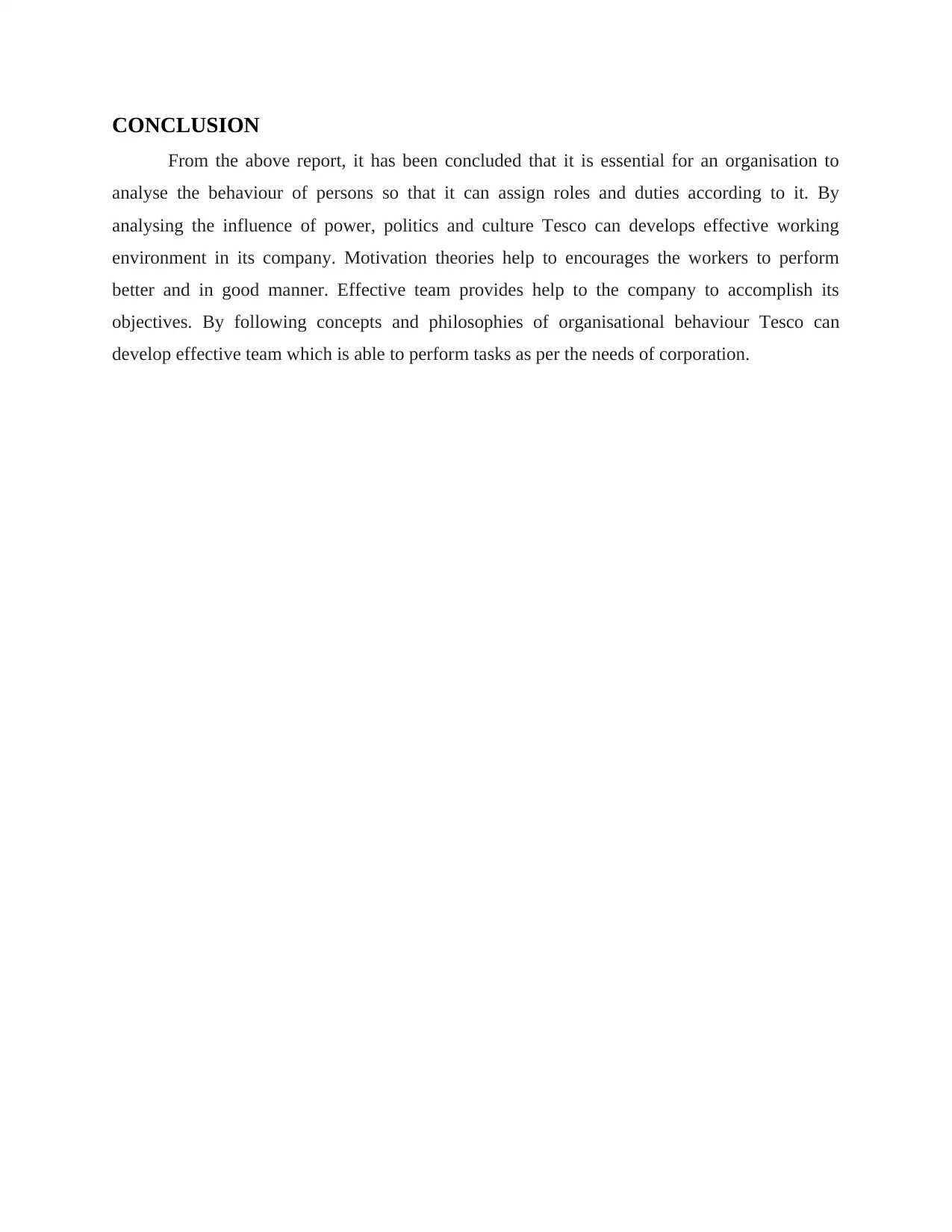
CONCLUSION
From the above report, it has been concluded that it is essential for an organisation to
analyse the behaviour of persons so that it can assign roles and duties according to it. By
analysing the influence of power, politics and culture Tesco can develops effective working
environment in its company. Motivation theories help to encourages the workers to perform
better and in good manner. Effective team provides help to the company to accomplish its
objectives. By following concepts and philosophies of organisational behaviour Tesco can
develop effective team which is able to perform tasks as per the needs of corporation.
From the above report, it has been concluded that it is essential for an organisation to
analyse the behaviour of persons so that it can assign roles and duties according to it. By
analysing the influence of power, politics and culture Tesco can develops effective working
environment in its company. Motivation theories help to encourages the workers to perform
better and in good manner. Effective team provides help to the company to accomplish its
objectives. By following concepts and philosophies of organisational behaviour Tesco can
develop effective team which is able to perform tasks as per the needs of corporation.
Secure Best Marks with AI Grader
Need help grading? Try our AI Grader for instant feedback on your assignments.
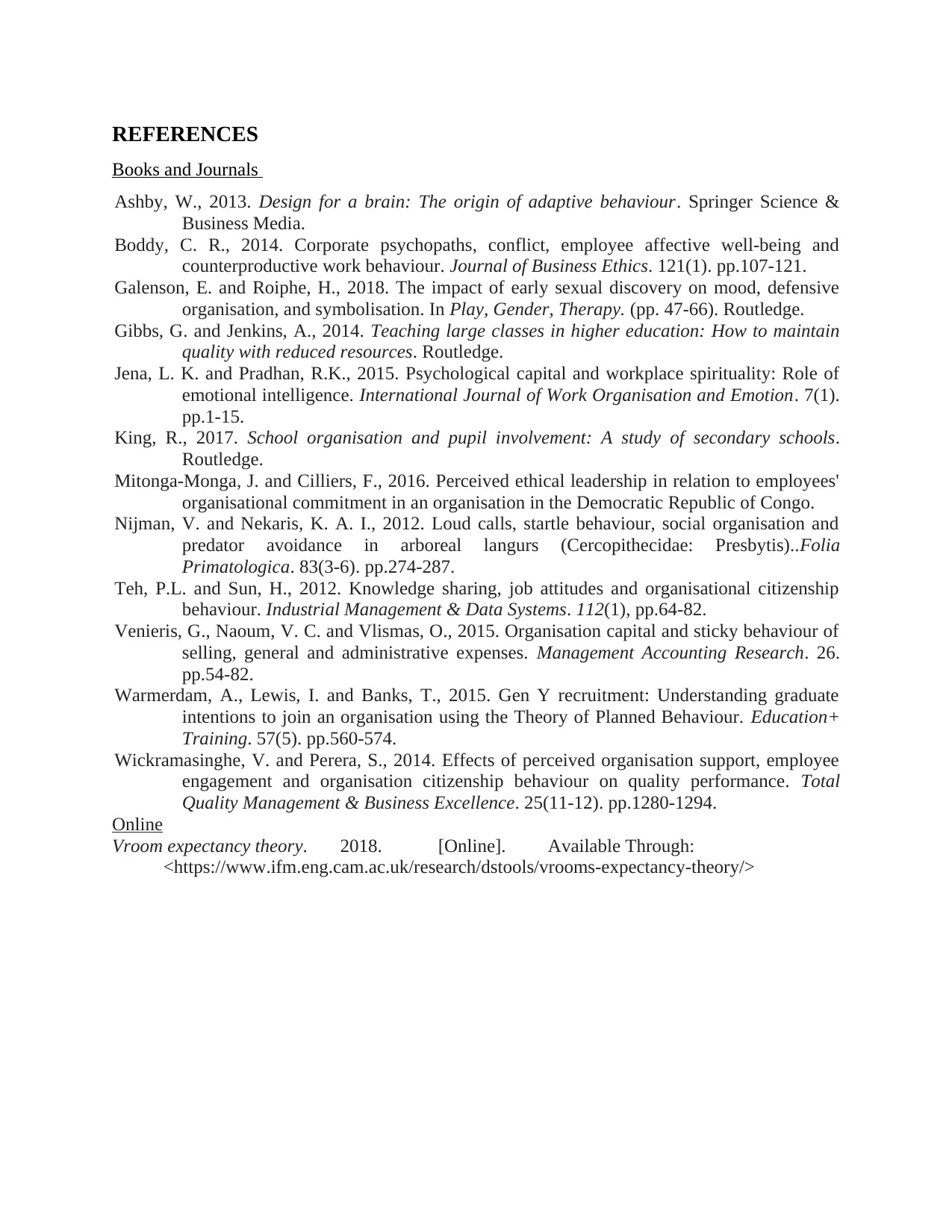
REFERENCES
Books and Journals
Ashby, W., 2013. Design for a brain: The origin of adaptive behaviour. Springer Science &
Business Media.
Boddy, C. R., 2014. Corporate psychopaths, conflict, employee affective well-being and
counterproductive work behaviour. Journal of Business Ethics. 121(1). pp.107-121.
Galenson, E. and Roiphe, H., 2018. The impact of early sexual discovery on mood, defensive
organisation, and symbolisation. In Play, Gender, Therapy. (pp. 47-66). Routledge.
Gibbs, G. and Jenkins, A., 2014. Teaching large classes in higher education: How to maintain
quality with reduced resources. Routledge.
Jena, L. K. and Pradhan, R.K., 2015. Psychological capital and workplace spirituality: Role of
emotional intelligence. International Journal of Work Organisation and Emotion. 7(1).
pp.1-15.
King, R., 2017. School organisation and pupil involvement: A study of secondary schools.
Routledge.
Mitonga-Monga, J. and Cilliers, F., 2016. Perceived ethical leadership in relation to employees'
organisational commitment in an organisation in the Democratic Republic of Congo.
Nijman, V. and Nekaris, K. A. I., 2012. Loud calls, startle behaviour, social organisation and
predator avoidance in arboreal langurs (Cercopithecidae: Presbytis)..Folia
Primatologica. 83(3-6). pp.274-287.
Teh, P.L. and Sun, H., 2012. Knowledge sharing, job attitudes and organisational citizenship
behaviour. Industrial Management & Data Systems. 112(1), pp.64-82.
Venieris, G., Naoum, V. C. and Vlismas, O., 2015. Organisation capital and sticky behaviour of
selling, general and administrative expenses. Management Accounting Research. 26.
pp.54-82.
Warmerdam, A., Lewis, I. and Banks, T., 2015. Gen Y recruitment: Understanding graduate
intentions to join an organisation using the Theory of Planned Behaviour. Education+
Training. 57(5). pp.560-574.
Wickramasinghe, V. and Perera, S., 2014. Effects of perceived organisation support, employee
engagement and organisation citizenship behaviour on quality performance. Total
Quality Management & Business Excellence. 25(11-12). pp.1280-1294.
Online
Vroom expectancy theory. 2018. [Online]. Available Through:
<https://www.ifm.eng.cam.ac.uk/research/dstools/vrooms-expectancy-theory/>
Books and Journals
Ashby, W., 2013. Design for a brain: The origin of adaptive behaviour. Springer Science &
Business Media.
Boddy, C. R., 2014. Corporate psychopaths, conflict, employee affective well-being and
counterproductive work behaviour. Journal of Business Ethics. 121(1). pp.107-121.
Galenson, E. and Roiphe, H., 2018. The impact of early sexual discovery on mood, defensive
organisation, and symbolisation. In Play, Gender, Therapy. (pp. 47-66). Routledge.
Gibbs, G. and Jenkins, A., 2014. Teaching large classes in higher education: How to maintain
quality with reduced resources. Routledge.
Jena, L. K. and Pradhan, R.K., 2015. Psychological capital and workplace spirituality: Role of
emotional intelligence. International Journal of Work Organisation and Emotion. 7(1).
pp.1-15.
King, R., 2017. School organisation and pupil involvement: A study of secondary schools.
Routledge.
Mitonga-Monga, J. and Cilliers, F., 2016. Perceived ethical leadership in relation to employees'
organisational commitment in an organisation in the Democratic Republic of Congo.
Nijman, V. and Nekaris, K. A. I., 2012. Loud calls, startle behaviour, social organisation and
predator avoidance in arboreal langurs (Cercopithecidae: Presbytis)..Folia
Primatologica. 83(3-6). pp.274-287.
Teh, P.L. and Sun, H., 2012. Knowledge sharing, job attitudes and organisational citizenship
behaviour. Industrial Management & Data Systems. 112(1), pp.64-82.
Venieris, G., Naoum, V. C. and Vlismas, O., 2015. Organisation capital and sticky behaviour of
selling, general and administrative expenses. Management Accounting Research. 26.
pp.54-82.
Warmerdam, A., Lewis, I. and Banks, T., 2015. Gen Y recruitment: Understanding graduate
intentions to join an organisation using the Theory of Planned Behaviour. Education+
Training. 57(5). pp.560-574.
Wickramasinghe, V. and Perera, S., 2014. Effects of perceived organisation support, employee
engagement and organisation citizenship behaviour on quality performance. Total
Quality Management & Business Excellence. 25(11-12). pp.1280-1294.
Online
Vroom expectancy theory. 2018. [Online]. Available Through:
<https://www.ifm.eng.cam.ac.uk/research/dstools/vrooms-expectancy-theory/>
1 out of 11
Related Documents
Your All-in-One AI-Powered Toolkit for Academic Success.
+13062052269
info@desklib.com
Available 24*7 on WhatsApp / Email
![[object Object]](/_next/static/media/star-bottom.7253800d.svg)
Unlock your academic potential
© 2024 | Zucol Services PVT LTD | All rights reserved.




